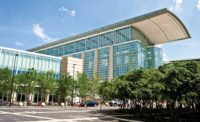In developed countries, the generation and reuse of water is a choice primarily driven by the recognition of decreasing resources and the desire to be conscientious stewards of the environment.
But in developing countries, where infrastructure is nonexistent, creating an independent water supply and constructive use of the waste, is a requirement based on economic and environmental necessity. The International Rainwater Harvesting Alliance (IRHA), based in Geneva, Switzerland, leads schools in poor communities to meet their need for clean water and sanitation through its Blue Schools Programme.
IRHA’s Blue Schools Programme
Launched in 2005, the Blue Schools Programme is an initiative of the IRHA with the objective of contributing to the Millennium Development Goals formulated by the United Nations. IRHA’s contribution to this objective is to increase the number of schools in the world with access to clean drinking water and basic sanitation facilities. This has resulted in a substantial improvement of living conditions, and thus children’s health and environmental awareness, in Africa, Asia and Latin America.
The components of this program include rainwater catchment, sanitation, training on environmental awareness, health and hygiene, as well as initiatives on gardening and reforestation.
Rainwater Catchment: Providing a rainwater catchment system not only serves to provide drinking water but also delivers an accompanying social benefit. In water-deprived areas, a day’s water ration needs to be secured as the first action before going to school, often being purchased with the student’s lunch money. A rainwater harvesting system gives schools sustainable access to clean drinking water, allowing more productive time in school.
Sanitation: Access to proper toilets is often taken for granted in the West. In developing countries, adequate sanitation is not a given but must be introduced in the schools. Composting toilets give children hygienic toilets and prevent groundwater pollution. Having access to a secure toilet offers protection for women and children who now no longer need to worry about being attacked as they look for privacy in the woods. Toilets of choice are the ventilated improved pit, latrines and dry EcoSan-type toilets, enabling treatment of human waste.
Contrary to Western custom, urine and feces in developing countries are considered a resource and not a liability. Urine is collected in separate reservoirs, to be diluted later and used as a fertilizer; while double pit latrines allow the unused pit to compost the waste for later use.
With the Blue Schools Programme, children take their first steps in effective waste management, while being introduced to the benefits of gardening. They sort out recyclable waste, use organic waste for composting and keep the school campus clean. Waste often is composted and sold as a profit center. What is not sold to local gardeners is used to fertilize fruit trees and gardens to supplement the children’s lunches, improving their nutrition and the schools self-sufficiency.
Training: To make the new facilities self-sustaining, children are trained to use the new facilities and provided with training on environmental issues, health and hygiene. They learn about the water cycle, water conservation, wastewater treatment and environmental protection. Equipped with this new knowledge, they become active participants in raising awareness in their community about climate change and the management of limited resources.
A child, a tree initiative: Children take part in reforestation campaigns; learning about local tree species, planting a tree or helping to take care of trees in a park around the school campus. Fruit trees are commonly planted near campus to take advantage of the recycled waste and to provide a food resource to the school. Every child is responsible for looking after his or her own tree. The result of reforestation improves the environment of the school and reduces harmful erosion.
A school, a garden Initiative: The children are introduced to gardening. They start working in the Blue Schools’ vegetable garden and learn to share the fruits and vegetables they produce. These fruits and vegetables help supplement the children’s lunches, improving their nutrition while excess can be sold to help make the school self-sustaining.
Off-grid power: Because the schools are generally off the utility grid, solar photovoltaic cells are used to provide power for pumping and water purification. The electrical power also will enable the use of computers as an aid to promote literacy and expand the students’ perspective. It will enable the children to have access to the knowledge of other cultures, to form a friendly network and to eventually open the possibility for future job prospects.
Solar ovens are something that could be introduced to be part of the school canteen and thus will encourage local communities to start using solar ovens as an alternative to charcoal, which leads to denuding of the local forest.
Program management
The Blue Schools Programme was founded during 2005 and initiated in the IRHA Secretariat based in Geneva. The IRHA staff and many volunteers handle the project formulation, fundraising, project implementation and evaluation, while also providing financial reports for donors. The programs rely on interaction and collaboration with local partners. Once a partnership is established, a national or regional NGO formulates a request for collaboration.
Preschool in Mexico improves community’s water quality
The indigenous Mazateca communities in Palo de Marca, Oaxaca, Mexico, located in the Sierra Mazateca mountain range in northeastern Oaxaca, are located 2,000 meters above sea level.
The majority of the inhabitants of the communities are substance farmers, surviving by tilling the soil and harvesting maize, squash and beans as they have been for thousands of years. They have intermittent access to water during the rainy season; during the dry season they are forced to walk long distances to fetch water. All the schools and health clinics have very poor water and sanitation infrastructure.
The objectives of a preschool in the region were:
• Improve access to drinking water and sanitation in the preschool;
• Improve the environmental conditions in the school area;
• Strengthen social networks and build capacity of the local population to cope with water shortages; and
• Sustainable facility management.
Activities were:
• Construction of two rainwater harvesting systems with two ferrocement tanks of 12,000-liter capacity;
• Construction of two composting toilets and one hand-washing station;
• Creation of a school garden;
• Implementation of four water purifiers;
• Reforestation of 100 trees through the “A child, a tree” initiative;
• Participatory trainings in sanitation and hygiene; and
• DIY trainings and workshops to train locals in rainwater harvesting system design, installation and maintenance.
Simple technologies, such as composting toilets and rainwater catchment, have been shown to make a significant yet cost-effective impact where they have been implemented. The technologies and skills learned for rainwater catchment and improved hygiene are easily transferable. The chief beneficiaries of this program are the children, teachers and school staff members.
Secondary benefits are achieved when the children pass on this knowledge to the parents. The result is that entire communities benefit from the positive environmental impact and personal improvement brought by the involvement with the Blue Schools Programme. The economic benefit is unquestionable, with reduction in health-care costs, lower absentee rates from school, higher number of students attending school and financially sustainable schools being associated benefits.
Each project of the Blue Schools Programme has a sustaining sponsor whose contributions make these projects possible. As these projects are based on simple and cost-effective technologies, they require modest investment yet bring considerable benefits.
Unlike in the United States, where investments in millions of dollars are needed for water and sanitation projects, significant impact can be achieved with just a few thousand dollars.
Aside from contributing to the United Nations Millennium Development Goals, supporting the Blue Schools Programme has the tangible benefit of the contributor seeing how his involvement is making a significant impact in the world by simply helping provide basic sanitation and water.
This article was originally titled “Net-zero by necessity” in the March 2015 print edition of pme.
HELPFUL LINKS:










